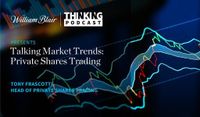As the landscape of recruitment evolves, employers are feeling the pressure to adapt or risk falling behind. The rapid advancements in technology, particularly in artificial intelligence (AI), are reshaping how organizations attract, assess, and retain talent. At the upcoming SHRM Talent 2025 event on March 26, Nicole Belyna, director of talent acquisition and inclusion at SHRM, will lead a panel discussion focusing on the crucial trends that are defining the future of hiring.
Belyna notes that AI has become an increasingly pertinent topic within talent acquisition. “AI continues to be a hot topic, with organizations at various levels of engagement—some fully integrating AI-driven hiring tools, while others are still figuring out where to start,” she explains. The consensus amongst experts is that AI technologies are making recruitment processes faster and smarter, leveraging data-driven insights to enhance candidate sourcing and engagement processes.
Moreover, AI-powered tools are automating many administrative tasks that once bogged down talent acquisition professionals, allowing them to shift their focus towards building relationships and strategic planning. This shift is critical, especially as organizations increasingly recognize the need for skilled workers.
However, Belyna cautions that while AI offers many benefits, it is not without challenges. “Bias in AI models is a concern, and over-automation can make the process feel cold and impersonal,” she points out. Equipping talent acquisition professionals with the necessary skills to leverage AI effectively is essential to avoid potential pitfalls and use technology responsibly.
This next session will examine how organizations can integrate AI into their hiring processes while ensuring that human elements remain intact. It will also explore the significant practice of skills-based hiring, which is shifting focus from traditional degree requirements towards competencies. Belyna suggests that this approach expands access to a broader talent pool, opening doors for those who may have not suited traditional education paths.
“We’ll discuss how AI is reshaping recruitment. We’ll explore how AI tools can improve productivity without sacrificing the human touch,” Belyna emphasizes. She highlights that organizations are increasingly driven to rethink their return-to-office policies, especially as job seekers now demand remote and hybrid work as standard rather than perks. This shift places pressure on companies that insist on strict return-to-office mandates, leading to potential disengagement and higher turnover among employees seeking more flexible arrangements.
“Return-to-office policies are evolving; remote and hybrid work are standard expectations for job seekers in 2025,” she states, underscoring the need for businesses to negotiate these changes effectively. Belyna encourages organizations to find a balance that retains in-person collaboration while offering employees autonomy in their work arrangements.
In her view, companies willing to listen and adopt policies that support flexibility will better engage and retain their top talent. By restructuring hybrid models or core collaboration days, companies can navigate the complexities of adapting to modern workplace dynamics.
But, it’s not just about flexible work conditions. Belyna will emphasize the importance of enhancing the candidate experience, especially when it comes to attracting new employees to HR roles. “There’s this perception that we are not walking the walk, and we’ll talk about what needs to change,” she admits.
Meanwhile, the private shares market has also been undergoing transformative changes, marked significantly by macroeconomic factors, as discussed by Tony Frascotti, head of private shares trading at William Blair. “Investors are waiting for clarity on Trump's policies before making moves on rates,” he explained during an episode of William Blair Thinking on March 7, 2025.
Frascotti highlighted some ongoing trends within the private shares market, particularly an influx of investments in the late-stage names that have recently raised meaningful capital. “We have seen some typical crowding in many of these ultra-late stage names that have raised pretty meaningful primaries or done meaningful tender offers in the last 3 to 6 months,” he noted.
The anticipation of several IPOs in the near term adds a reflective touch to conversations around late-stage private companies. “I think that we will have some IPOs in the short to medium term, and those IPOs should be a bit of a bellwether for some of these late-stage privates,” Frascotti expressed, suggesting that successful IPO performances could offer crucial insights into the overall health of private market assets.
Another pertinent theme emerging is the resurgence in the cryptocurrency market. Frascotti commented, “We’ve seen a pretty healthy resurgence in the crypto market in general,” indicating a restored investor interest as many previously held-back assets show signs of growth.
Market regularity, clarity, and the performance of late-stage assets are pivotal not only for private share trading but also venture capital fundraising as it is becoming increasingly difficult for many firms. Frascotti shared, “Fundraising remains difficult for all but some of the top-tier VCs,” highlighting a concerning landscape for investors eager to enter the market.
In conclusion, as 2025 unfolds, organizations in various sectors must recalibrate their strategies to meet the evolving expectations of talent and investors alike. Whether it's the integration of AI in hiring practices or adapting to a dynamic investment environment, the emphasis will be on flexibility, inclusivity, and strategic planning to foster growth and retain talent amidst the shifting tides of today’s economic landscape.






